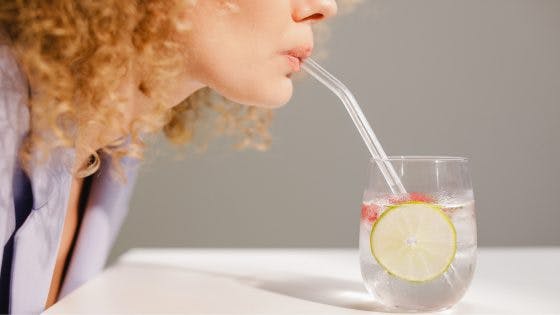How To Stay Hydrated In 7 Easy Ways, According To A Top Nutritionist
8 minutes read
Staying hydrated and drinking water – like breathing – is critical to life. Yet most of us take it for granted.
A shocking 62% of Brits admit not drinking the recommended daily intake, and 34% say they don’t drink any water at all.
Our body is made up of 60% of water. We lose water daily through breathing, sweat, urine, and bowel movements. So, it is a no-brainer that if we don’t replenish it with the fluids it loses in the process, it will not function well. Similarly, a car that runs out of fuel would stop.
Without enough water, the body will behave poorly, leading to dehydration. Dehydration happens when your body loses more fluid than you take in, which can result in fatigue, poor brain function, weakened digestion and a host of physical problems.
The solution is relatively straightforward: drink fluids.
However, with the majority of people claiming they’re too ‘busy’ to drink their recommended daily water intake and half of the population thinking that drinking water is rather ‘boring’, we asked a leading nutritionist for much-needed water hacks.
Beauty Daily consulted with Marilia Chamon, the founder of Gutfulness Nutrition, a leading nutritional therapist and gut health expert, to provide seven tips to stay hydrated.
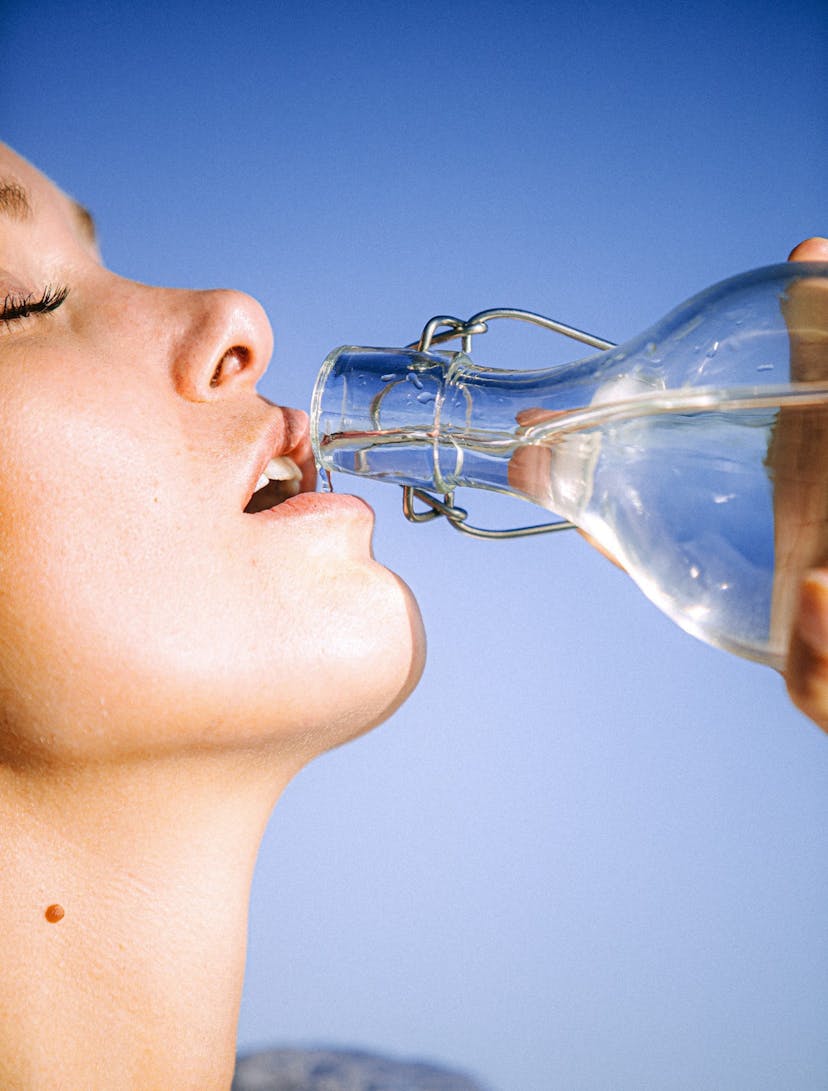
Why is water so important for our bodies? And how important is it to stay hydrated?
“Water is vital for cellular function. The content of water inside the cells is responsible for biochemical reactions,” says Chamon.
Biochemical reactions assist living cells in sustaining life and allow cells to grow.
Chamon adds: “The content outside the cells, on the other hand, is used for the movement and transportation of waste and nutrients.”
For example, our largest organ, the skin, comprises skin cells. They are made of water, protein, and fats. So, when our bodies aren’t getting enough water, we can see this negatively affecting the state of our skin because our skin cells are not replenished.
You should aim to drink the NHS-recommended eight glasses, which equals about two litres a day.
So, whenever you sweat, urinate and pass stools, it’s the water doing its function to move and eliminate toxins and waste from your body. When you have a healthy and hearty meal, it absorbs and transports nutrients you ingest to different parts of your body.
“Water provides necessary fluids for breathing and even protecting our teeth – it ensures your mouth produces enough saliva to protect your teeth – regulating body temperature and lubricating joints, among others. Without the appropriate fluid intake, essential body functions, such as circulation, digestion, and absorption, would be impaired,” Chamon says.
How do I know if I am dehydrated?
If you’re feeling parched, you’re already dehydrated. So drink up! But there are other signals the body sends when it’s in desperate need of fluids, like when you feel fatigued, constipated, craving sweets, have muscle cramps, or exhibit signs of dry and flushed skin.
The most practical way to check whether your body is dehydrated is by conducting these two self-assessment tests as per experts:
Skin test. Place your two index fingers flat under your cheekbone to pinch up some skin on the back of your hand. Then, lift the skin on the cheek up towards your eye. Let go; the skin should return to its normal state in less than a few seconds. If the skin returns to normal more slowly, you might be dehydrated.
Read next: How To Rejuvenate Dehydrated Skin
Urine test. The best way to check your hydration is by observing the colour of your urine first thing in the morning. Experts say if you’re adequately hydrated, you will have lemonade-coloured urine. However, darker yellow, or the colour of apple juice, indicates dehydration, per UC San Diego Health advice.
7 Nutritionist-approved hacks to drink more water every day
To reach your daily recommended fluid intake, the NHS recommends six to eight cups or glasses of fluid a day. This includes water, lower-fat milk, and sugar-free drinks, including your favourite cup of tea and coffee (as long as you don’t drink too much). You can also boost your hydration levels with a water-rich diet: try melon, tomatoes, cucumber, berries, celery, spinach, soups and jelly. And even plain yoghurt is up to 75% water.
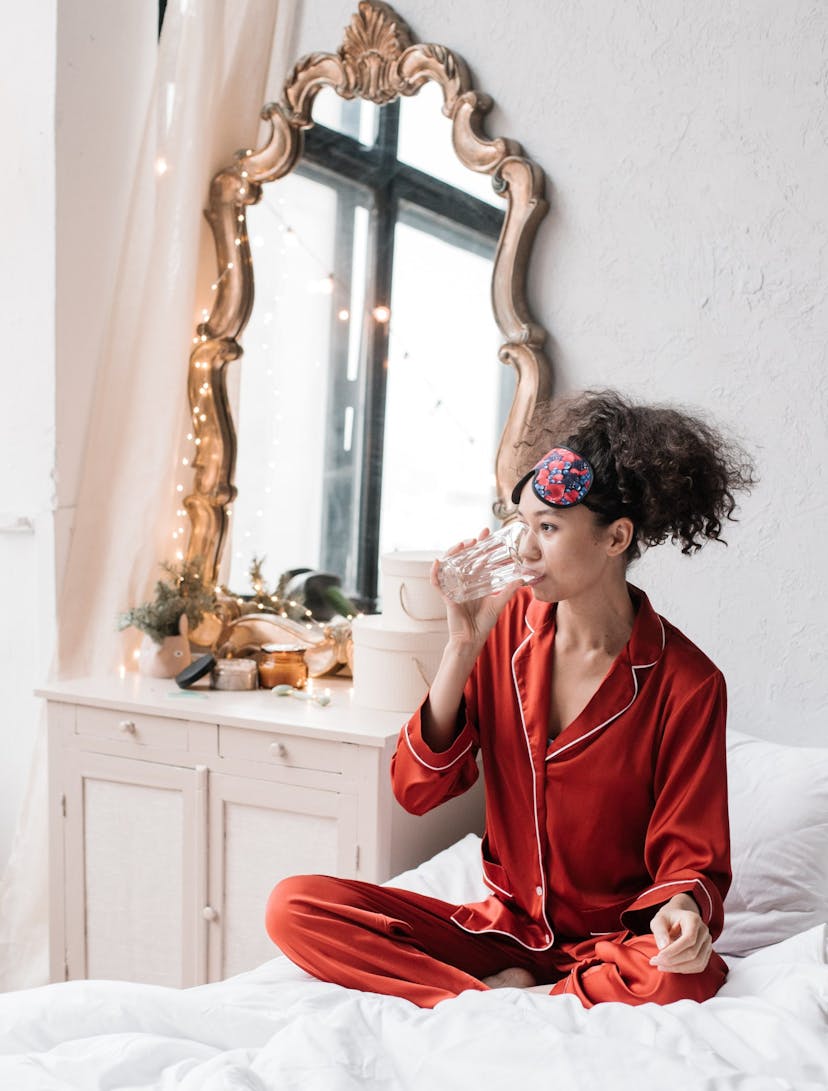
1. Drink water first thing in the morning to rehydrate the body after a night of sleep
We often get mildly dehydrated overnight; it happens when we breathe or sweat at night. So the best way to set yourself up for a day of success is to drink first thing in the morning.
Experts advise drinking at least 650 mL (3 cups) of water right after waking up. Of course, you might need some training to do this, so start drinking one cup until you get used to it. Drinking large amounts of water all at once can make you feel extra nauseous because your stomach is full.
Wait around 45 minutes before your first meal. Studies show that drinking water on an empty stomach can give your diet a big boost as it can help raise the metabolic rate by almost 30%.
2. Always keep your reusable water bottle handy
It’s a visual reminder and a terrific way to develop the habit of sipping water without realising it. You can also download water apps to track and remind you of your daily water intake. Check out Water Reminder and WaterMinder®.
3. Don’t chug, sip
Chamon advises: “Aim for small sips throughout the day rather than waiting until when you’re thirsty.”
Chugging water too fast means you’ll find yourself frequently visiting the loo. Sipping water slowly throughout the day allows the body to efficiently process the water and keep you hydrated. It also strengthens your digestive system and improves your metabolism.
Read next: 7 Expert-Backed Ways to Boost Your Metabolism
4. Add flavour to your water
One of the reasons why many Brits find it hard to stay hydrated is that they find drinking water ‘boring’. So instead, many Brits prefer to drink flavoured water. If you find yourself in the same situation, do yourself a favour and start infusing water with fruits, veggies, and herbs.
“Infuse your water with cinnamon sticks, fresh ginger, sliced lemon, cucumber or fresh mint for flavour,” Chamon recommends.
If you want more flavour than water but healthier than a carbonated drink, check out Holistic Nutritionist Maria Marlowe‘s great alternative: Agua Fresca.
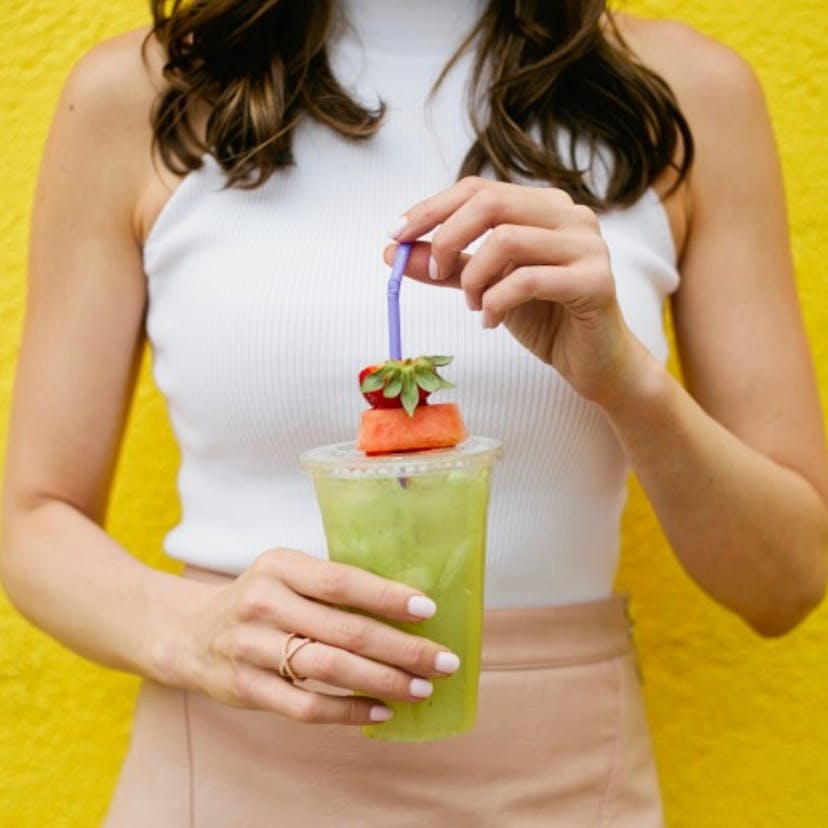
It’s a healthy option to juice for two reasons: it’s half water and half fruit, veggie, and herb. Also, it’s blended, so you get the fruit pulp and fibre. You can try combinations from cucumber + mint + lemon and honeydew + cucumber + lemon to watermelon + lime + mint. See the recipe here.
But if you want zero prep time, you’ll find Fount’s All-Natural Drops extra convenient. Want a refreshing and tangy drink sans the sugar? Try Fount’s Refresh and Revitalise Raspberry and Green Tea drops £12.
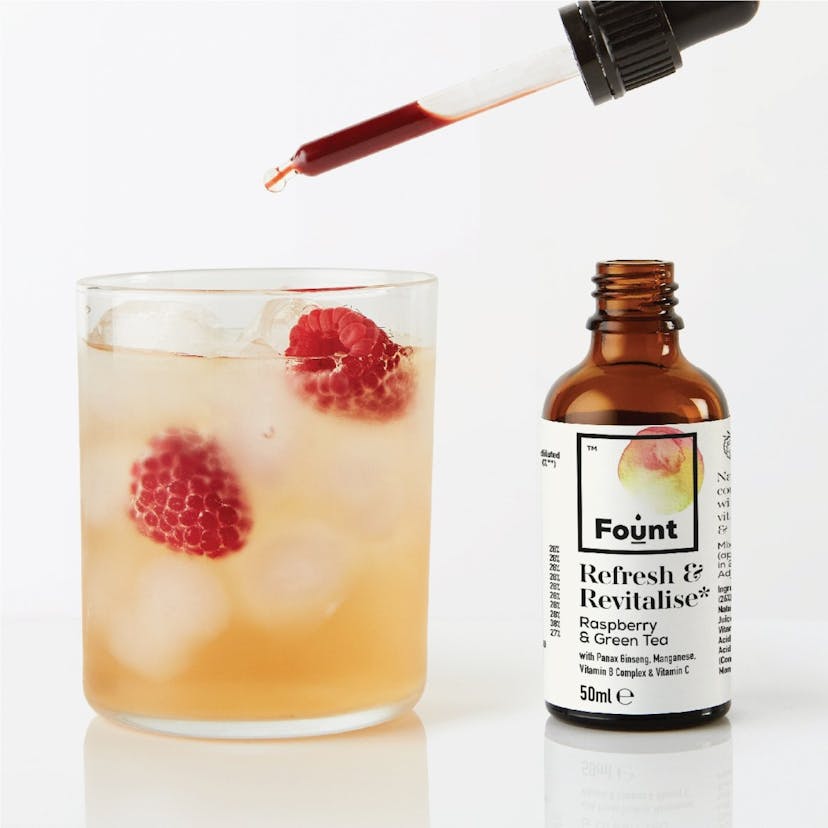
Add a few drops to your water to boost hydration and wellness. Do this first thing in the morning or before heading out to a party. It is formulated with green tea and raspberry with panax ginseng, manganese, vitamin B complex, and vitamin C. 50ml bottle will give you 25 servings.
It contains none of the nasties: no added sugar or artificial sweeteners, flavours, colours or preservatives. Check other blends like Cleanse and Detox, Heart Health and Stress Relief. Each product contains a tailored blend of botanicals, vitamins, minerals and amino acids to achieve a particular health benefit. Check here.
Read next: The Best Way To Do A Juice Cleanse, According To Nutritionists
5. Eat electrolyte-rich foods
“Hydration is more than just water; we need electrolytes such as sodium, potassium, magnesium, and calcium to be transported in and out of our cells and help the body absorb fluids. In addition, fresh whole foods such as fruits and vegetables are packed with electrolytes,” says Chamon.
Foods that replenish electrolytes are spinach, kale, avocados, broccoli, potatoes, and almonds.
Beauty Daily recommends supplementing your diet with Artah Cellular Hydration, £32.
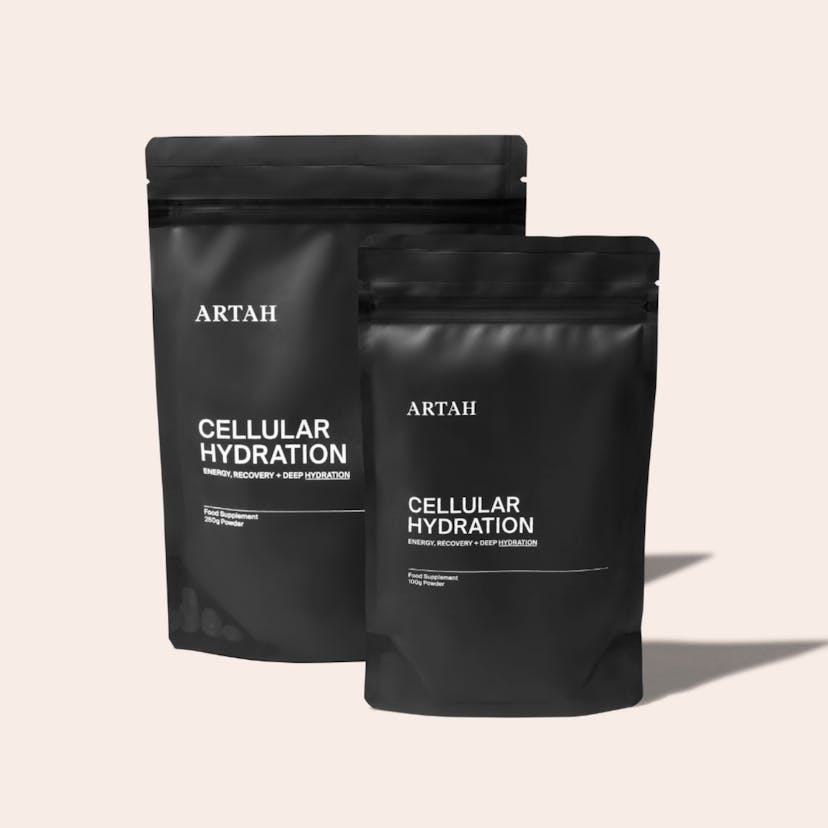
This electrolyte powder is great for energy, focus, mood and more. It is loaded with potassium, calcium, vitamin C and magnesium to replenish your electrolyte store, fuel the microbiome, hydrate the skin, and promote physical and mental energy. In addition, it’s sugar and sweetener free so load up on as much as you like throughout the day.
6. ‘Eat’ your water
Load up with water-rich foods to help you stay hydrated. Chamon recommends adding: “Fruits and vegetables with the highest water content to your grocery list including cucumber, tomatoes, spinach, watermelon, melon, broccoli, oranges, apples and berries.”
7. Drink coffee moderately
Some of you might ask: ‘Does coffee hydrate you?’ Chamon says: “Moderate amounts of coffee have similar hydrating properties to water.” But it doesn’t give you the green light to dismiss water altogether.
According to Harvard experts, moderate coffee consumption can be incorporated into a healthy diet with about two to five cups daily. Caffeine is a diuretic, so consumed in excess means you might urinate and lose more fluid if you overindulge from the work coffee machine. To stay hydrated, compensate with additional liquids. If you want one glass of coffee, follow it with another full glass of water, balancing yourself back out.
If you’re wondering whether fizzy drinks hydrate you, experts confirm it. However, Chamon recommends, “Sticking to plain water” if boosting your hydration levels is your primary goal.
Think of carbonated soft drinks, beer and spirits as a dessert or occasional indulgence, as they’re loaded with sugar and increase your risk of obesity and diabetes. Regularly drinking sugar-sweetened drinks may also influence the amount of fat around our organs. If you drink any of these, hydrate yourself with water.
Feeling Frazzled? If you find your skin feeling extra parched, there are topical solutions you can use to bring H20 back in, along with making sure you’re keeping yourself hydrated.
Look for creams or serums enriched with hyaluronic acid; something like products from the Clarins’ Hydra-Essentiel Range. Beauty Daily recommends Hydra-Essentiel Rich Cream – Very Dry Skin, £26.
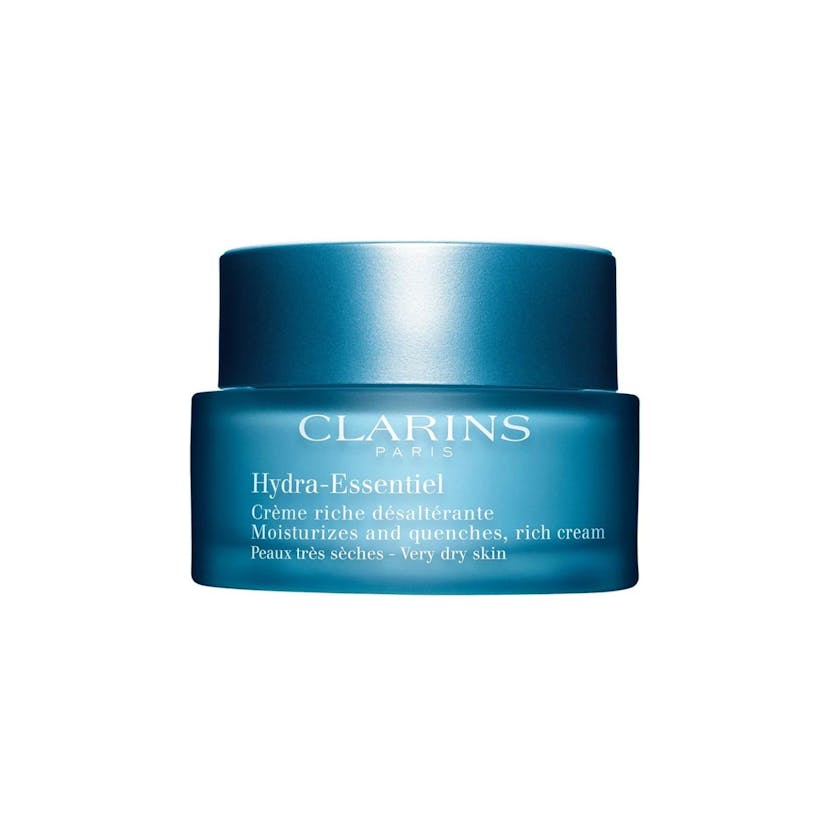
This feather-weight texture moisturiser glides like butter on the skin, absorbs quickly, and instantly comforts dehydrated skin. The key plant ingredient, the leaf of life, boosts the skin’s hyaluronic acid production leaving even the driest of skins supple and radiant. Read next: Dehydrated vs Dry Skin: What’s the Difference?
Read next: Your Ultimate Winter Skincare Routine Guide
Sign up for our newsletter
We will keep you in the loop for special offers, exclusive gifts and product news.

